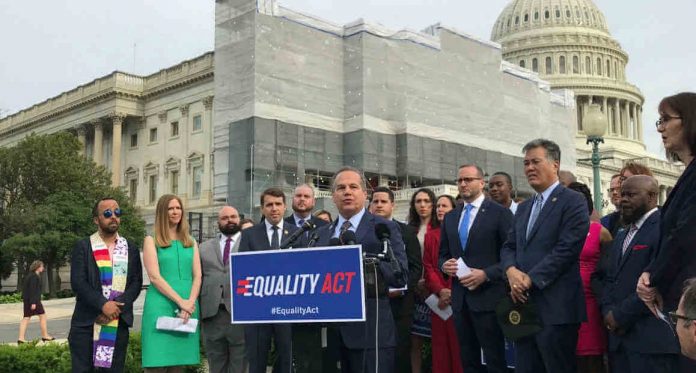Out, gay Congressman David Cicilline of Rhode Island, along with Senator Jeff Merkley of Oregon, last Thursday announced the reintroduction of the federal Equality Act — civil rights legislation that would prohibit discrimination against LGBTQ people in employment, education, credit, jury service, federal funding, housing and public accommodations.
“In 2021, every American should be treated with respect and dignity,” said Cicilline in a statement. “Yet, in most states, LGBTQ people can be discriminated against because of who they are, or who they love. It is past time for that to change. I’m proud to introduce the Equality Act today, and I look forward to continuing to work with Senator Merkley to get this bill signed into law.”
A House vote is expected to come this week. Also this week, the bill is to be formally introduced in the Senate.
In 2019, the House passed the Equality Act (236–173) with every Democrat and eight Republicans voting for it. Cicilline, chair of the Congressional LGBTQ+ Equality Caucus, had introduced the bill that year too. But in the Senate, Majority leader McConnell blocked the bill from consideration.
Now, in 2021, the House appears to have enough votes to pass it again, Senate Majority Leader Schumer has promised a Senate vote, calling for its passage, and President Biden has promised to sign it swiftly into law. But the question remains if there will be enough votes to pass it in the Senate? Sixty are needed.
That means, assuming no filibuster break plus 50 Democratic senators on board, 10 Republican votes needed. Here’s the scoop on that from The Washington Blade:
The two Republicans who appear to be the lowest hanging fruit are Sen. Susan Collins (R-Maine), who was the only Republican co-sponsor in the previous Congress, and Sen. Lisa Murkowski (R-Alaska), who voted for the LGBTQ Employment Non-Discrimination Act in 2013 and signaled she cast a ballot as a regular voter in 2018 against an anti-transgender bathroom initiative in Anchorage.
Collins, who’s reportedly peeved after the Human Rights Campaign snubbed her in the 2020 election in favor of her Democratic challenger, didn’t respond to multiple requests by the Blade to comment on the Equality Act. A spokesperson for Murkowski couldn’t immediately be reached.
The next tier is Sen. Rob Portman (R-Ohio), who has a gay son, and Sen. Pat Toomey (R-Pa.). Both Portman and Toomey voted for the Employment Non-Discrimination Act in 2013. After that, the bill’s supporters may look to Joni Ernst (R-Iowa), who has signaled an openness to allowing transgender people in the military, and Thom Tillis (R-N.C.), who has voted to affirm spousal benefits to same-sex couples.
But with Romney signaling via a spokesperson late Tuesday he won’t support the Equality Act, the remaining math is tricky. Options could be Sens. Rick Scott (R-Fla.) and Marco Rubio (R-Fla.), although their presidential ambitions may mean their votes are off the table, or John Cornyn (R-Texas) with demographic changes making his state more “blue.” Sen. Richard Burr (R-N.C.) voted for “Don’t Ask, Don’t Tell” repeal in 2010, but against the Employment Non-Discrimination Act in 2013. …
One Republican lobbyist said talk is underway about a Republican compromise along the lines of the Fairness for All Act introduced last year by Rep. Chris Stewart (R-Utah).
“I think there’s well over 10 Republicans in the Senate who want to get to ‘yes,’” the Republican lobbyist said. “And I think that right now we have this dynamic which is that there are more pro-LGBTQ Republicans in Congress, than probably at any time, but we have to meet them, not even in the middle, we just have to come over a few notches from the left, and meet them and take their concerns seriously.”
If the Equality Act were amended “to reflect those concerns to protect fundamental religious freedoms,” the Republican lobbyist said, such as granting greater leeway to religious institutions in the Equality Act, supporters could “pass that through with 60 or more votes.”
Not a subscriber? Sign up today for a free subscription to Boston Spirit magazine, New England’s premier LGBT magazine. We will send you a copy of Boston Spirit 6 times per year and we never sell/rent our subscriber information. Click HERE to sign up!









